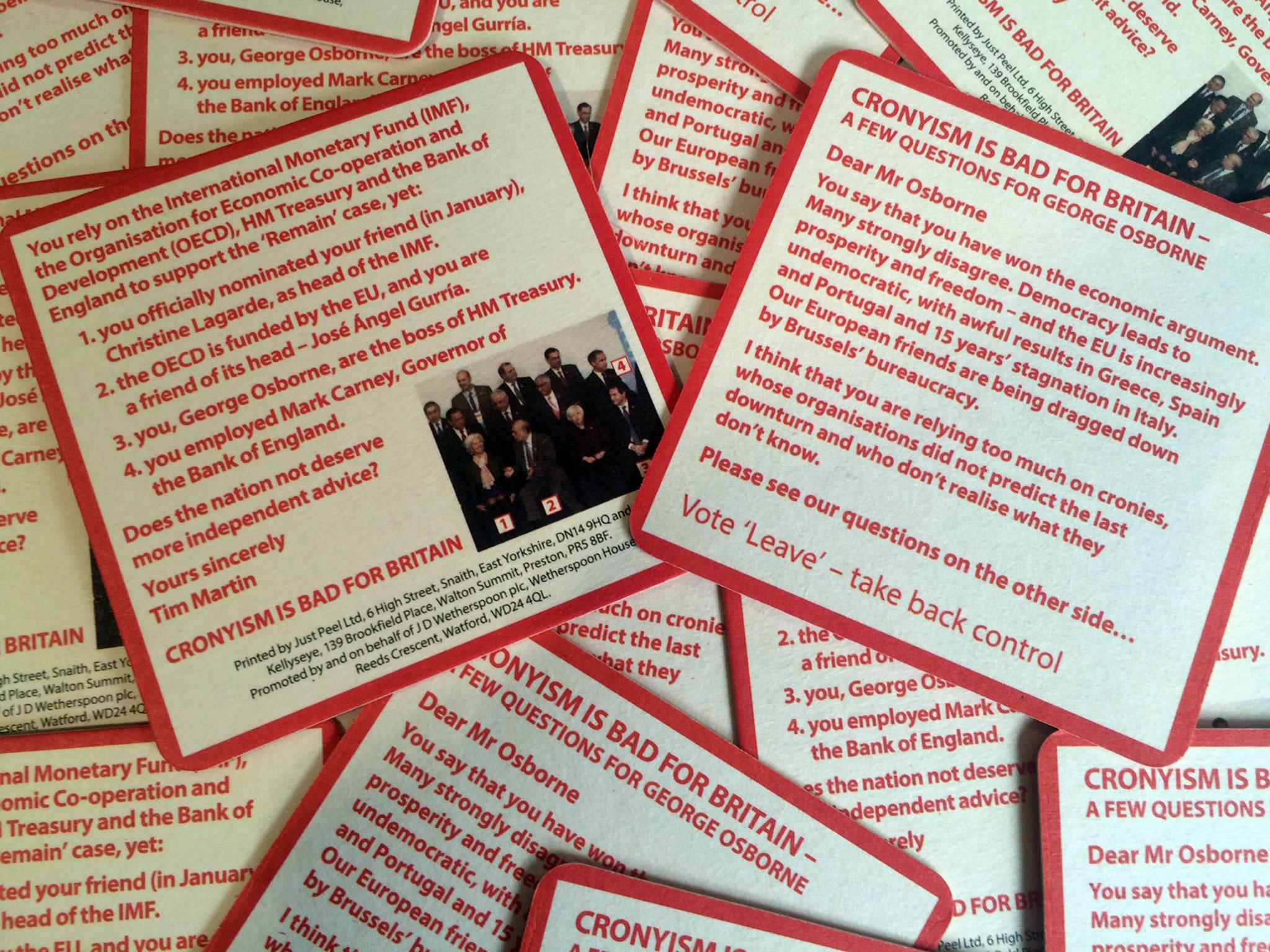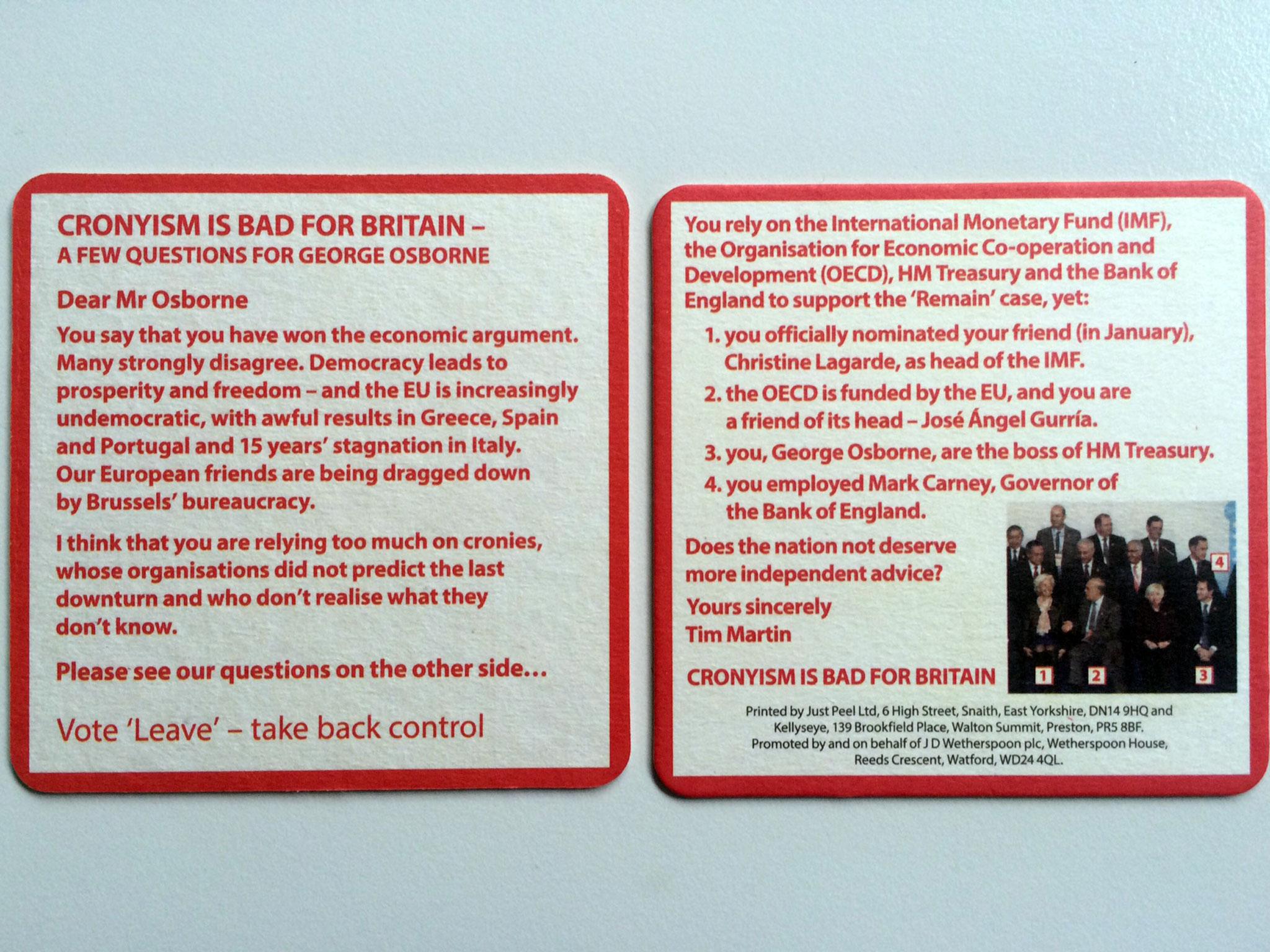JD Wetherspoon pub chief Tim Martin sends new Brexit message to George Osborne on beer mats
It follows on from the pub chain’s first mats, which carried messages that compared the International Monetary Fund (IMF) with to scandal-hit FiFA

Your support helps us to tell the story
From reproductive rights to climate change to Big Tech, The Independent is on the ground when the story is developing. Whether it's investigating the financials of Elon Musk's pro-Trump PAC or producing our latest documentary, 'The A Word', which shines a light on the American women fighting for reproductive rights, we know how important it is to parse out the facts from the messaging.
At such a critical moment in US history, we need reporters on the ground. Your donation allows us to keep sending journalists to speak to both sides of the story.
The Independent is trusted by Americans across the entire political spectrum. And unlike many other quality news outlets, we choose not to lock Americans out of our reporting and analysis with paywalls. We believe quality journalism should be available to everyone, paid for by those who can afford it.
Your support makes all the difference.JD Wetherspoon has printed half a million new beer mats calling for the UK to leave the EU in the final days of campaigning.
It follows on from the pub chain’s first mats, which carried messages that compared the International Monetary Fund (IMF), a “Remain” supporting institution, with to scandal-hit FiFA.
This time, 500,000 have been printed for the company’s 920 pubs. They are titled “cronyism is bad for Britain – a few questions for George Osborne.”

The beer mat has a message on both sides, which is signed by Wetherspoons founder and chairman Tim Martin, a strong believer in leaving the EU.
As well as asking, “Does the nation not deserve more independent advice?” the message addressed to George Osborne draws attention to the Chancellor’s friendship with Christine Lagarde, the managing director of the IMF and Jose Angel Gurria, current secretary of the Organisation for Economic Co-operation (OECD), which said that a Brexit would be bad “from every single angle”.
The mat tells drinkers that George Osborne has employed Mark Carney, the governor of the Bank of England, suggesting Carney’s predictions are biased.
Tim Martin also blamed David Cameron and George Osborne for trying to fool the public by using scare stories.
“Their main economic case relies on these people and their views are not independent or believable.
“In an interview reported on Sunday June 19, Cameron said that ignoring the above ‘experts’ views on Brexit would be like taking ‘a risk with your family getting into a faulty car’ on a motorway and to jumping ‘out of the aeroplane.’
“Cameron yet again deliberately uses images of fear and destruction,” Martin said.
A Brexit would be “bad for the UK, it would be bad for Europe, it would be bad for the world, including the United States,” Angel Gurría, secretary general of the Organization for Economic Cooperation and Development, said in an interview last week.
“You already have enough uncertainty in the world today. We don't need more,” he added.
The IMF predicted that a vote to leave the EU could reduce economic growth by up to 5.5 per cent over the next three years in its worst-case scenario on Friday. The gloomy outlook was driven by a sharp decline in the pound last week.
On Monday sterling was up 1.6 per cent against the dollar at $1.459. Polls over the weekend suggested a shift toward a vote to remain in the European Union.

The EU referendum debate has so far been characterised by bias, distortion and exaggeration. So until 23 June we we’re running a series of question and answer features that explain the most important issues in a detailed, dispassionate way to help inform your decision.
What will happen to immigration if there's Brexit?
Will the UK benefit from being released from EU laws?
What is Brexit and why are we having an EU referendum?
Does the UK need to take more control of its sovereignty?
Could the UK media swing the EU referendum one way or another?
Will we gain or lose rights by leaving the European Union?
Will Brexit mean that Europeans have to leave the UK?
Will leaving the EU lead to the break-up of the UK?
Will Brexit make the UK more or less safe?
Will the UK benefit from being released from EU laws?
Will leaving the EU save taxpayers money and mean more money for the NHS?
What will Brexit mean for British tourists booking holidays in the EU?
Will Brexit help or damage the environment?
Join our commenting forum
Join thought-provoking conversations, follow other Independent readers and see their replies
0Comments